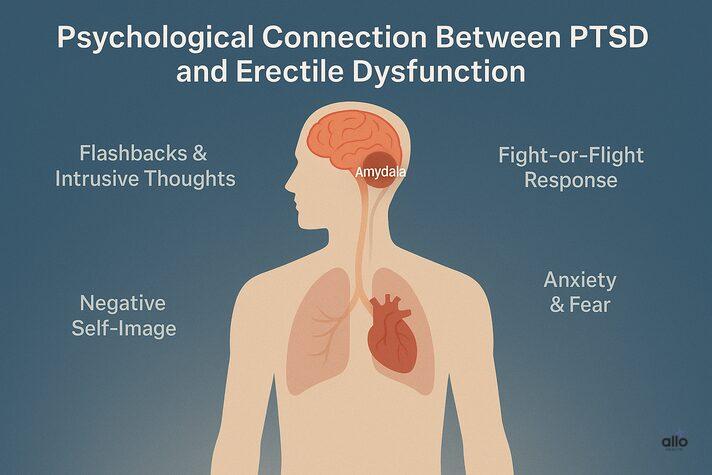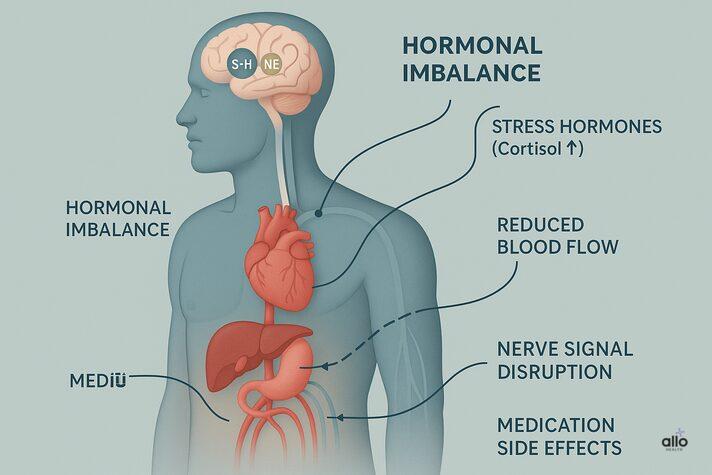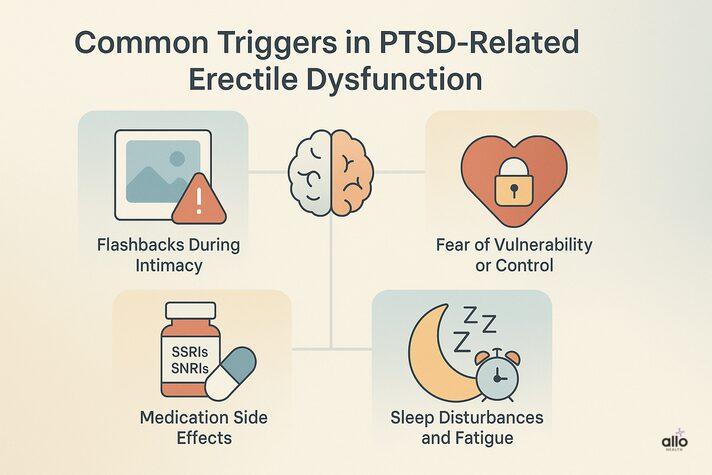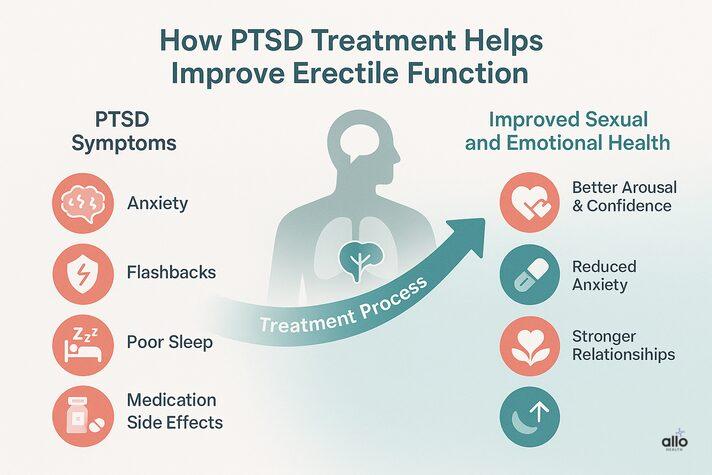PTSD and Erectile Dysfunction: Trauma’s Impact on Sexual Health
Written by Dr. Deepali Anand

Dr. Deepali is a medical writer and healthcare professional with a background in clinical surgery and patient care. Having transitioned from active clinical practice to medical communications, she specializes in bridging the gap between complex clinical data and patient education. Dr. Deepali is dedicated to creating evidence-based content that is grounded in scientific rigor and empathy, ensuring that sensitive topics like sexual wellness and mental health are accessible and empowering for every reader.
•
November 14, 2025
Our experts continually monitor the health and wellness space, and we update our articles when new information becomes available.

Quick Read
Yes, PTSD can cause erectile dysfunction. Trauma affects both the mind and body, disrupting how the brain, nerves, and hormones work together during arousal. The same “fight-or-flight” response that protects you during danger can later interfere with relaxation, blood flow, and sexual performance. Common causes include anxiety, flashbacks, hormonal imbalance, medication side effects, and poor sleep or stress-related habits. These factors make it harder to feel safe or connected during intimacy. The encouraging part is that PTSD-related ED is treatable. With the right mix of therapy, medication, lifestyle changes, and partner communication, most men can restore both sexual confidence and emotional balance. Healing the trauma often helps the body heal too.
PTSD and erectile dysfunction are more connected than many realize. Men who live with post-traumatic stress disorder often experience difficulties with sexual desire, arousal, or performance, not because of a lack of attraction, but because trauma changes how the brain and body respond to stress and intimacy. In simple terms, the same “fight-or-flight” response that protects the body during trauma can interfere with relaxation, blood flow, and arousal later on.
In this article, we’ll explore how PTSD can cause erectile dysfunction, looking at both the psychological and biological links, from anxiety, flashbacks, and hormonal changes to medication effects and lifestyle habits.
Allo asks
Did you know PTSD can cause erectile dysfunction?
Can PTSD cause Erectile Dysfunction?
Yes, PTSD can cause erectile dysfunction. Studies[1] show that men with PTSD have a higher risk of developing erectile dysfunction due to interconnected psychological and biological mechanisms.
In a 2002 study published in the Journal of Urology, around 85% of combat veterans receiving treatment for PTSD reported symptoms of erectile dysfunction, compared to only 22% of men in a control group without PTSD.[1][2]
PTSD affects the nervous system, hormone balance, and the body’s stress response, all of which directly influence sexual function and arousal. For some men, even the emotional sensations linked to arousal can unintentionally trigger PTSD symptoms, making sexual activity difficult or distressing.
Let’s explore how this happens in more detail.

Psychological Connection Of PTSD and Erectile Dysfunction
1. Fight or Flight Response
During sexual arousal, the body normally increases blood flow to the penis and activates nerves that support an erection. But in people with PTSD, this response can get mixed up. Instead of relaxation, sexual arousal may trigger a fight-or-flight reaction, which shuts down the body’s ability to sustain an erection.
This happens because heightened emotions or intimacy can activate trauma-related anxiety, causing the body to interpret sexual arousal as a potential threat rather than a safe or pleasurable experience.
2. Intrusive Memories and Flashbacks
Certain sensations, sounds, or body positions during intimacy can trigger flashbacks or intrusive memories of a traumatic event, even if that trauma wasn’t sexual[3]. These sudden mental images or emotions can make it hard to stay present, focus on pleasure, or maintain an erection.
3. Anxiety and Fear
PTSD often brings persistent anxiety, fear, and a lack of safety, all of which disrupt the calm and trust needed for sexual arousal. When the mind is alert for danger, it’s difficult for the body to relax enough to achieve or maintain an erection.
4. Negative Thoughts and Guilt
Feelings of guilt, shame, or self-blame related to the trauma can lower self-esteem and reduce sexual confidence[4]. Negative thoughts about oneself or one’s partner can also affect relationship satisfaction, further contributing to erectile dysfunction.

Biological Connection Between PTSD and ERectile Dysfunction
1. Hyperarousal and Stress Response
PTSD keeps the body in a constant state of alert, known as sympathetic nervous system hyperactivity. This chronic “on edge” state limits the body’s ability to activate the parasympathetic system, which is necessary for relaxation and erection.
2. Comorbid Health Conditions
Men with PTSD often have other health issues such as high blood pressure, diabetes, or depression, all of which are known to cause or worsen erectile dysfunction. These conditions add to the overall strain on the body and mind.
3. Hormonal Imbalance
PTSD disrupts the balance of stress hormones like cortisol and norepinephrine, which affect both memory and arousal[5]. These hormonal changes can interfere with the brain’s signals to the penis, making it harder to achieve or sustain an erection.
4. Medication Side Effects
Many PTSD medications can impact sexual function. Common examples include:
- Selective serotonin reuptake inhibitors (SSRIs)
- Serotonin-norepinephrine reuptake inhibitors (SNRIs)
- Antipsychotics
- Lithium
These medicines can cause reduced sexual desire, delayed orgasm, or erectile difficulties as side effects.
5. Lifestyle Factors
PTSD can lead to unhealthy habits such as smoking, poor diet, and lack of physical activity. Over time, these behaviors affect blood flow and overall health, further increasing the risk of erectile dysfunction.

Common Triggers in PTSD-Related Erectile Dysfunction
1. Flashbacks During Intimacy
Sounds, touches, or positions during sex can trigger flashbacks or distressing memories, making it hard to relax or stay aroused.
2. Fear of Vulnerability or Control
PTSD can cause a fear of closeness or losing control, leading to avoidance or difficulty maintaining arousal.
3. Antidepressant Side Effects (SSRIs, SNRIs)
PTSD medications like SSRIs and SNRIs can cause reduced libido, delayed orgasm, or erectile dysfunction as side effects.
4. Sleep Problems and Fatigue
Poor sleep and exhaustion from PTSD can lower energy, hormones, and focus, all key for healthy sexual function.

Can PTSD Treatment Improve Erectile Function?
Yes. When PTSD symptoms improve, sexual function often improves too. Treatment usually works best when it targets both the trauma and the erectile dysfunction together.
1. Psychotherapy
- Therapies like Cognitive Processing Therapy (CPT) and Prolonged Exposure (PE) help process traumatic memories and reduce anxiety.
- Adding sex therapy or CBT for sexual issues can ease performance anxiety and improve communication with partners.
2. Medications
- SSRIs (sertraline, paroxetine) and SNRIs (venlafaxine) are first-line PTSD treatments.
- Prazosin can reduce nightmares and may cause fewer sexual side effects.
- Treating related depression or anxiety helps restore normal sexual function.
- PDE5 inhibitors like sildenafil or tadalafil directly improve erections.
3. Lifestyle Changes
Healthy habits support recovery:
- Eat a balanced diet
- Exercise regularly
- Get enough sleep
4. Integrated Treatment
The most effective care combines trauma therapy, medication, and sex therapy. This holistic plan treats both PTSD symptoms and erectile dysfunction, helping men regain confidence and sexual health.
Tips to Manage PTSD-Related ED
Managing PTSD-related erectile dysfunction (ED) takes time, but small, consistent changes can make a big difference. Focusing on overall mental and physical well-being helps restore confidence and improve sexual health.
1. Exercise, Sleep, Relaxation, and Meditation
- Regular physical activity boosts blood flow, reduces stress, and balances hormones.
- Prioritize good sleep to help your body and mind recover.
- Practice relaxation or mindfulness meditation to calm anxiety and improve focus during intimacy.
2. Avoid Alcohol, Smoking, and Pornography Overuse
- Alcohol and smoking can worsen both PTSD symptoms and ED by affecting blood vessels and brain chemistry.
- Limit or avoid excessive pornography, as it can raise unrealistic expectations and increase performance anxiety.
3. Communicate with Your Partner
Open and honest communication with your partner can reduce tension, increase trust, and rebuild intimacy. Emotional safety often translates into physical comfort and better sexual function.
Key Takeaway
Can PTSD cause erectile dysfunction? Yes, PTSD can cause erectile dysfunction. It’s a significant risk factor, but recovery is gradual and achievable.
Recognizing sexual dysfunction as a key part of PTSD, not just a side effect, is vital for full recovery. Treating both the mental and sexual aspects together leads to stronger relationships, improved confidence, and better overall well-being.
Disclaimer
The following blog article provides general information and insights on various topics. However, it is important to note that the information presented is not intended as professional advice in any specific field or area. The content of this blog is for general educational and informational purposes only. The content should not be interpreted as endorsement, recommendation, or guarantee of any product, service, or information mentioned. Readers are solely responsible for the decisions and actions they take based on the information provided in this blog. It is essential to exercise individual judgment, critical thinking, and personal responsibility when applying or implementing any information or suggestions discussed in the blog.
Most Asked Questions
Does PTSD cause intimacy issues?
Yes. PTSD can make closeness feel unsafe, leading to fear, avoidance, or emotional distance. These intimacy issues can strain relationships. Healing involves rebuilding trust through therapy, honest communication, and gradual exposure to emotional and physical connection.
Can you recover from psychological erectile dysfunction?
Absolutely. Most men recover with the right approach — combining therapy, medication, and lifestyle changes. As PTSD symptoms improve, sexual function often returns too. Open communication with your doctor or therapist helps tailor treatment to your needs.
What are the physical symptoms of PTSD?
Physical symptoms can include increased heart rate, sweating, sleep problems, fatigue, and muscle tension. These are signs of the body’s stress system being overactive — which can also contribute to sexual issues like erectile dysfunction.
How does trauma affect sexual performance?
Trauma keeps the body in a “fight-or-flight” mode, which blocks the relaxation needed for arousal. Many men with PTSD experience flashbacks, fear, or emotional numbness that interfere with sexual desire and focus. Therapy can help retrain the body’s stress response and restore sexual confidence.
Can PTSD give you erectile dysfunction?
Yes. PTSD can cause erectile dysfunction by affecting both the mind and body. It increases stress hormones, disrupts blood flow, and triggers anxiety during intimacy. These changes make it harder to relax and maintain an erection, but with treatment, recovery is possible.
Sources
- 1.
Posttraumatic stress disorder and the risk of erectile dysfunction: a nationwide cohort study in Taiwan
- 2.
Sexual Dysfunction in Male Iraq and Afghanistan War Veterans: Association with Posttraumatic Stress Disorder and Other Combat-Related Mental Health Disorders: A Population-Based Cohort Study
- 3.
Intrusive memories of trauma: A target for research bridging cognitive science and its clinical application
- 4.
Relationship Between Post-Traumatic Stress Disorder and Sexual Difficulties: A Systematic Review of Veterans and Military Personnel
- 5.
Post-traumatic stress syndrome and sexual dysfunction


